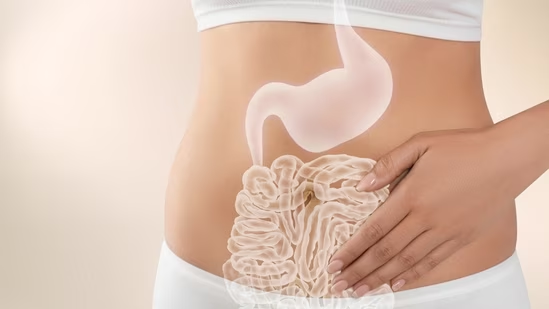
By the age of 40, subtle but significant changes begin to affect the digestive system, influencing everything from nutrient absorption to bowel regularity. In an interview with HT Lifestyle, Dr. Ankur Jain, Associate Director and Unit Head of Gastroenterology, Hepatology, and Endoscopy at Max Super Speciality Hospital, Dwarka, shed light on the five key changes that typically occur after 40 and shared expert advice on how to manage them.
According to Dr. Jain, gut health in your 40s and beyond is shaped by a mix of age, diet, lifestyle, and medical factors. A proactive approach to nutrition, exercise, and regular check-ups can play a crucial role in maintaining a healthy digestive system.
1. Slower Digestion and Metabolism
As people age, the movement of food through the digestive tract slows down. This decline in motility, along with reduced secretion of digestive enzymes, can result in bloating, constipation, and a general feeling of fullness.
Management Tip: A high-fiber diet, regular hydration, and consistent physical activity can help support healthy digestion.
2. Decrease in Stomach Acid (Hypochlorhydria)
Many individuals over 40 experience a drop in stomach acid production, which can impair the breakdown of food and absorption of key nutrients like vitamin B12, iron, and calcium. It also increases the risk of gut infections.
Management Tip: Eating smaller, more frequent meals and incorporating fermented foods into the diet may aid digestion and nutrient absorption.
3. Gut Microbiome Imbalance
With age, the diversity and balance of gut bacteria tend to decline, affecting immune function, mood, and overall digestive health. This imbalance can be worsened by antibiotics, poor diet, and stress.
Management Tip: Including probiotics and prebiotic-rich foods like garlic, onions, and bananas, and leaning toward a plant-based diet can help maintain a balanced microbiome.

4. Increased Risk of Gastrointestinal Disorders
Weakened gastrointestinal linings can make individuals over 40 more prone to acid reflux, diverticulosis, and irritable bowel syndrome (IBS).
Management Tip: Regular medical check-ups, avoiding trigger foods (such as spicy meals), and not eating late at night can reduce the risk of these conditions.
5. Effects of Long-term Medications and Comorbidities
Many people begin long-term medications after 40 for conditions like diabetes or hypertension. These drugs can affect gut motility and microbial balance, sometimes leading to constipation or diarrhea.
Management Tip: Discuss gut-friendly medication options with your doctor and use dietary supplements wisely to help mitigate side effects.
Dr. Jain emphasized that a personalized and preventive approach is essential for preserving gut health after 40. Balanced eating habits, staying active, and managing stress are key to supporting a healthy digestive system well into later years
Overview
Mission: To provide timely, in-depth analysis and reporting on digital policy, tech adoption, and the impact of transformation on citizens and businesses.
Focus Areas: Digital governance (e‑services, e‑payment systems like UPI), FinTech, cyber‑security, digital identity (Aadhaar), digital literacy, Internet of Things, AI, and rural connectivity initiatives.
Audience: Policymakers, tech leaders, entrepreneurs, academics, and citizens interested in India’s digital future.
Under Srinivas G. Roopi’s leadership, Digital India Times offers a trusted window into the breakthroughs and challenges of India’s digital revolution—staying true to its tagline by continuously tracking the transformation reshaping the country.
Copyright ©2025 Digital IndiaTimes. All Rights Reserved
Designed and Developed by Galaxy Tech Solutions